The editors' notes for publishing historical fiction
A deep dive into historical fiction | Article 4 of 7
Are you an aspiring writer who has a concrete goal to (one day, eventually!) ‘get published’?
Do you have experience in the world of traditional publishing but have become jaded with the industry that appears to promise wealth and success - yet seemingly only for a tiny, tiny minority?
Perhaps, like me, you’re dipping your toe into the water of writing for a broader audience and are intrigued by the possibility of having your book out there on physical or virtual book shelves…
If you are any of these people - and even if you’re not - welcome here!
I’m Holly, if we haven’t met before, and I write about all things medieval history/archaeology and historical fiction. I am passionate about writing creative stories that engage a range of audiences in discussions of the past that overcome cultural stereotypes, which means that I seek out subjects and characters that aren’t what usually make it into the history books. If that sounds like you, do make sure to join our community of readers and writers, where we connect regularly over books, biographies, historical discussions, and Q&A/ask-me-anything chats.
During October and November, we are diving deep into the world of historical fiction.
Specifically, why we write/read it, how to get published in it, and what we think are the best examples out there, on and off Substack.
There have been three posts in the series so far, covering why we read/write historical fiction as well as different routes to publishing. You can read all the posts in the series at the link below.
How to get published - from the editors
and have very kindly put together their thoughts on historical fiction publishing from an editor’s perspective. 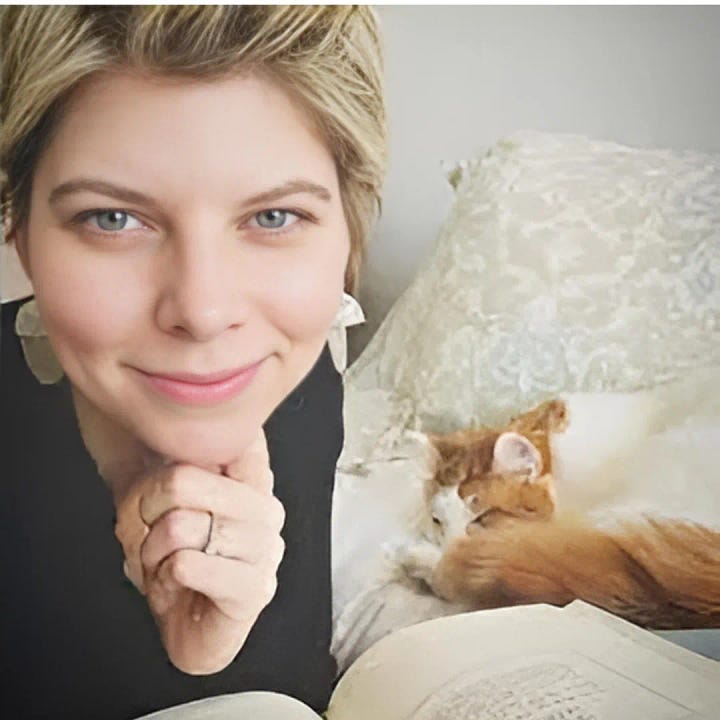

Melissa Makarewicz (
) is an author assistant and confidence coach with over 10 years of experience in social media management and email marketing. She has worked with a wide range of authors, from debut novelists to established bestsellers. Melissa is passionate about helping writers use their unique personal backgrounds and interests to bring excitement to their community building and marketing.Naomi (
) is a master's student in children's literature and has written and edited academic articles for about three years. In her free time she likes to read and write.I asked Melissa and Naomi a few questions about their experiences as editors, and here is what they had to say. Thank you both - and enjoy!
From
My Background in Historical Fiction Publishing
Hello there, amazing author! My name is Melissa and I run The Literary Assistant, where I specialize in author marketing and social media. I've had the pleasure of working with several historical fiction authors and being on the marketing team with the micro-publisher, History Through Fiction.
As someone passionate about this genre, I believe historical fiction has a unique power to bring to life forgotten or overlooked stories from the past. It allows us to view history through a fresh lens, highlighting the lives and accomplishments of people, sometimes long forgotten by today’s world, whose stories deserve to be told.
Through my work, I've seen the importance of not just writing a compelling historically-based story but also presenting it in a way that resonates with today's readers. This combination of well-crafted storytelling and well-planned marketing can make all the difference in getting your book noticed by the right audience.
Embrace Marketing as Part of the Publishing Process
One of the most common frustrations I hear from authors is the need to market their books after spending months or years writing them. However, I strongly believe marketing can be an enjoyable part of the journey. Marketing is just another version of storytelling - which I know you can do.
Historical fiction authors often have a rich, immersive love for stories throughout history and that shines through their writing. People might think we are a little over zealous about the past, but this passion is also your greatest asset when it comes to marketing.
Rather than seeing marketing as a drudgery, think of it as another way to use and enhance your storytelling skills! Consider what drew you to the historical period you’re writing about and share those elements in your content.
Perhaps you were fascinated by a lesser-known historical figure or discovered a unique piece of research that shaped your narrative. These moments of story discovery are exactly what will connect you with readers and potential fans. Build your marketing strategy around your story’s unique elements and your personal connection to it. You are part of the story as well!
Start Marketing Early and Find Your Comfort Zone
A common pitfall I see among aspiring writers is the tendency to delay marketing until after the book is published. While there’s no strict rule about when to start, the earlier, the better.
Some of the most successful authors I’ve worked with started building their platform years before their first book was released. By the time they were ready to publish, they had a dedicated audience who shared their interest in history and were eager to read their work.
Starting early also gives you the space to explore what type of content creation feels most natural to you.Remember, there are many ways to tell a story.
Not everyone enjoys being on camera for TikTok or Instagram Reels, and that’s okay. You might prefer long-form content, such as blog posts or newsletters on Substack, or perhaps you enjoy engaging in historical discussions on platforms like X or Threads. The key is to find a space where you’re comfortable and can create content sustainably over time. Consistency is far more important than trying to be everywhere all at once (and I know most of you would rather be writing).
Decide on Your Publishing Path
Ah! The dreaded path to publishing. When it comes to getting published, one of the first decisions you’ll need to make is whether to pursue traditional publishing or go the indie route. Each path has its pros and cons, so it’s important to align your publishing strategy with your personal goals. Educate yourself and make the best choice for YOU.
If your goal is to secure a traditional publishing deal, you’ll need to prepare to go through a lengthier process that involves submitting your manuscript to agents and editors. This path might offer more support (sometime, but not always) and distribution, but it also comes with longer timelines and less control over the final product.
On the other hand, indie publishing gives you more control and allows for a quicker release, but it requires you to handle more of the process yourself, including editing, cover design, and marketing. If you started writing because you crave creative freedom AND you are willing to invest time and effort into the process, indie publishing can be a great option.
Longevity in Your Writing Career
Just a few pieces of advice from me to you…
Remember that publishing a book doesn’t end after you type the end. After your book is out in the world, you’ll likely continue promoting it for years to come, whether through refreshing the cover or new marketing promotions, it’s more than likely going to be with you for a long, long time. Enjoying the journey and staying true to yourself creatively, it will help you avoid burnout and maintain a long and fulfilling writing career.
Don’t be afraid to pivot if things don’t go as planned, and always keep sight of what connected you with the book(s) you felt compelled to write in the first place.
You have the incredible opportunity to bring the past to life in ways that captivate and inspire readers in ways you could have never imagined. What an amazing gift you are giving to the world!
From
Though I do not have a direct connection to historical fiction, I have survived a three year literary bachelor program and received my diploma. Besides that I have been an editor and designer of Literatief, the magazine of student association Flanor in Groningen, The Netherlands. Currently I am completing a masters' degree in children's literature. This means that I have some experience when it comes to editing and the bookworld, which might help you get published, or at least help you improve your writing.
As far as writing goes I want to say that staring at a white page is intimidating and not at all helpful if you want to put something out. Something that might help is 'drawing' out your plot or ideas onto a real piece of paper. Usually mindmaps do it for me, but not every writer is the same. The important part is that you'll learn what works for you as your writing experience increases. Also don't feel as though you need to stick with one method, if you want to explore something new in terms of how you approach writing, please do it. That is the only way you'll discover if something works.
Another easy 'trap' to fall into is wanting your first draft to be perfect. First drafts are rarely perfect and that is also not the function of a first draft. The first draft is there so that when the time rolls around to make it cohesive you do not have to stare at an empty page. Write your first draft and do not put yourself under pressure.
Lastly I would say send in your finished manuscript to as many publishers that you resonate or agree with. Try to have a 'rejected by [x] amount of publishers by [month/year] goals. This helps with the disappointment of not getting selected and ensures that you actually put yourself out there. Sending in a manuscript can be terrifying, but if you do not send it at all you won't get published.
Do you have experience as an editor or having worked alongside an editor?
Feel free to continue the conversation in the comments! I’d love to hear from you.
Did you know I’ve written a book of short historical fiction stories?
It’s included in the paid membership at Telling Their Tales, or you can buy it HERE.
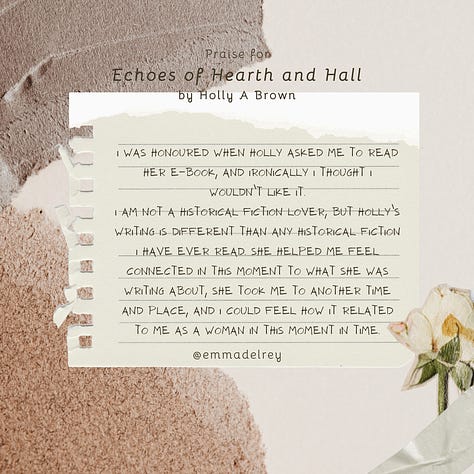
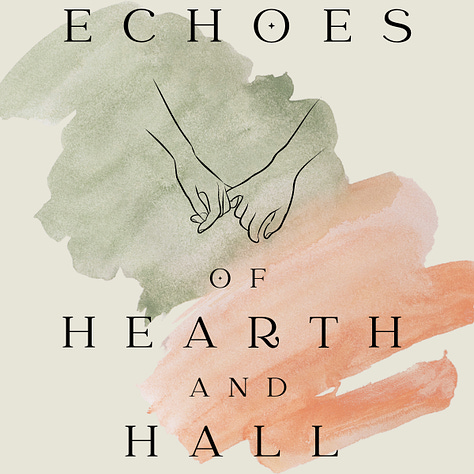
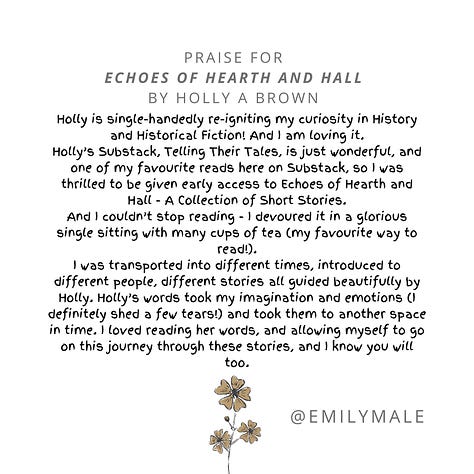


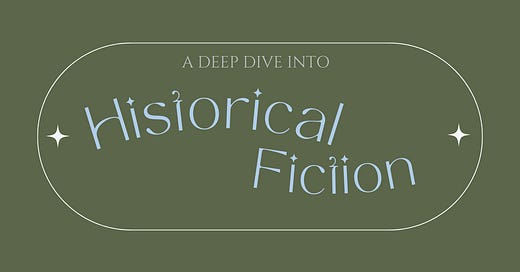





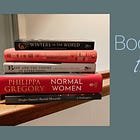



Thanks Naomi and Melissa for your words! Your experience is invaluable to hear, especially for aspiring published writers like me 🥰